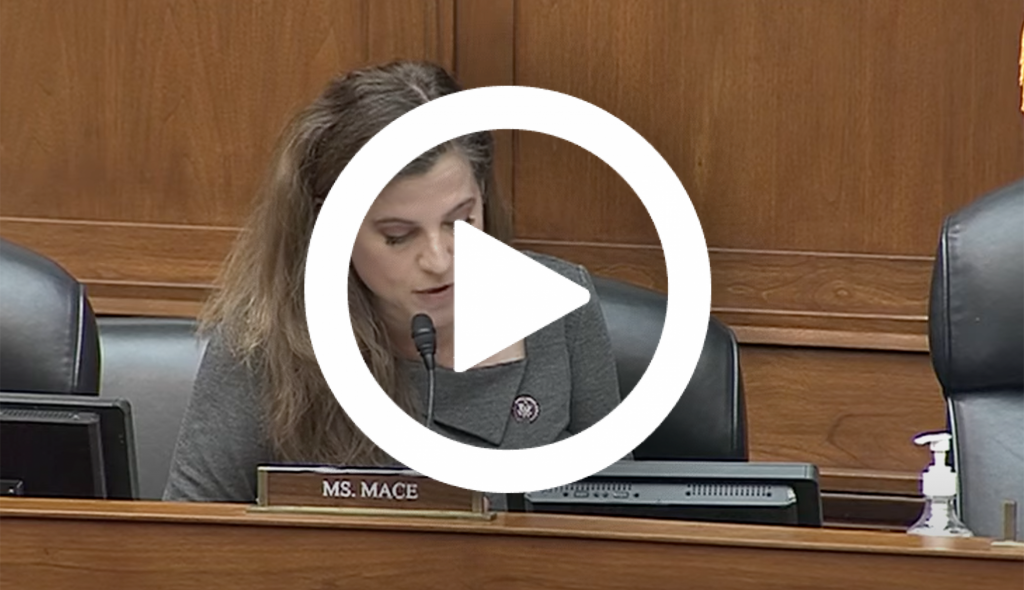Mace: No Child Attending Public School Should be Subject to Government Indoctrination
WASHINGTON – Civil Rights and Civil Liberties Subcommittee Ranking Member Nancy Mace (R-S.C.) opened today’s hearing by championing the importance of Americans’ First Amendment rights and emphasized how Congress should never infringe on the public’s freedom of speech. Public institutions of higher education are increasing their attacks on Americans’ First Amendment freedom, and she highlighted disturbing campaigns on campuses now aimed at expelling students and firing faculty who hold views outside of the progressive consensus.
In addition to liberal activists shutting down speech on college campuses, Subcommittee Ranking Member Mace drew attention to far-left efforts to indoctrinate young students with divisive and radical ideologies that are not appropriate for young children. She stated all children should be taught academic skills needed to succeed, along with the history of this country—both the good and the bad. Subcommittee Ranking Member Mace concluded by emphasizing the need for parental input and oversight of their children’s curricula, including what books should be required in school libraries.
The remarks as prepared for delivery are below:
Thank you, Chairman Raskin.
I’m pleased to have the opportunity today to highlight the importance of freedom of speech in this country, as well as the important work to ensure that K-12 curriculums in public schools serve our students well.
The First Amendment to the U.S. Constitution guarantees the right to freedom of speech to all Americans.
The First Amendment states that Congress shall make no law “abridging the freedom of speech”.
The government may only set reasonable time, place, and manner restrictions in very limited circumstances.
The government cannot and should not police the speech of its citizens, even when that speech is disagreeable or repugnant. We don’t punish thought-criminals in this country.
Freedom of speech isn’t just a legal mandate enshrined in our Constitution. It’s an essential element of our democracy. This fundamental freedom ensures all views across the spectrum are debated within the marketplace of ideas.
Public institutions of higher education are bound to abide by the First Amendment’s prohibition on restrictions on freedom of speech. Yet too often in this country, we see attacks on that freedom.
Public universities and colleges frequently run afoul of the First Amendment freedom by enforcing overbroad “speech codes,” or by chilling speech across campuses using “Bias Response Teams” to investigate thought-criminals.
There have also been disturbing campaigns on these campuses to expel students, fire faculty, or disinvite speakers who hold views considered to go against the progressive consensus.
These universities and colleges are unlawfully stifling speech to coddle young adults.
At a time in their educational careers where they should be exposed to a variety of ideas and perspectives.
While progressive activists shut down speech on college campuses, they are trying to hyper-expose our young school children who are still learning to read, write, add, and subtract.
In an effort to indoctrinate these young students, progressives are burdening curricula with divisive and radical ideologies such as race essentialism, racial scapegoating, and content of a sexual nature that is not appropriate for young children.
All children should be taught the academic skills they need to succeed, along with the history of this country—both the good and the bad.
We must teach our children about the problematic chapters in our history, yes. But we much also teach them about the heroes who led us into a more perfect union.
In fact, one of those heroes is joining our hearing today: Ruby Bridges, a civil rights icon and author who made history as a six-year-old girl, courageously braving a hostile crowd to integrate an all-white elementary school in Louisiana.
Public schools should exercise discretion—with parental input and oversight—to decide what is included in their curricula and what books to include in their libraries, especially for young elementary school students.
But no child attending our public schools should be subject to government indoctrination or exposed to radical ideologies while they are still building the foundations of their education.
Instead, we must teach critical thinking skills so college-age students can discern, argue, and act on their values when faced with open and frank academic discourse.
I thank all of the witnesses for appearing today, and look forward to a robust discussion about the First Amendment freedom of speech and how we can work together to preserve that freedom for all Americans.
Thank you, Chairman Raskin, and I yield back.
